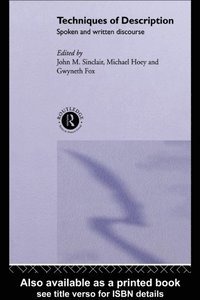
Liknande böcker
Discourse and Pragmatic Constraints on Grammatical Choices
Bok av Maria Manoliu-Manea
This book constitutes a quest for discourse and pragmatic features responsible for so-called optional grammatical choices. In an attempt to adduce new evidence for the assumption that, in order to capture adequately the reasons for the choice of various grammatical devices, a multi-variable model is necessary which could account for the development and the functioning of grammaticalized ethno-linguistic features in a variety of languages. The main hypothesis put forward is that, limited as they are by the possibilities of a given language, the choices open to speakers when reconstructing linguistically the state of affairs are determined first and foremost by their foci of attention. Orality is one the most salient features of Romanian, but the profound consequences of such a feature for Romanian grammar have not been fully explored. The most frequently invoked characteristic of this orality has been labeled 'redundancy', as is manifest in the proliferation of clitics. But, as shown by the data analyzed in this book, the impact of orality on Romanian grammar is much more far-reaching, encompassing such phenomena as: the preference for specific syntactic constructions as markers of the central discourse entity around which the event is reconstructed linguistically; the grammaticalization of the means for marking differences in the degree of discourse prominence (the degree of discourse-activated knowledge); the extensive use of markers of discourse continuity; the means by which the story is 'visualized'; the grammaticalization of various means used for marking stage distance (backgrounding versus foregrounding the event); and, diversified means for marking differences between speakers' expectations. The book highlights those features of Romanian grammar which can be most satisfactorily explained by the interaction between grammar and various discourse and pragmatic strategies.







